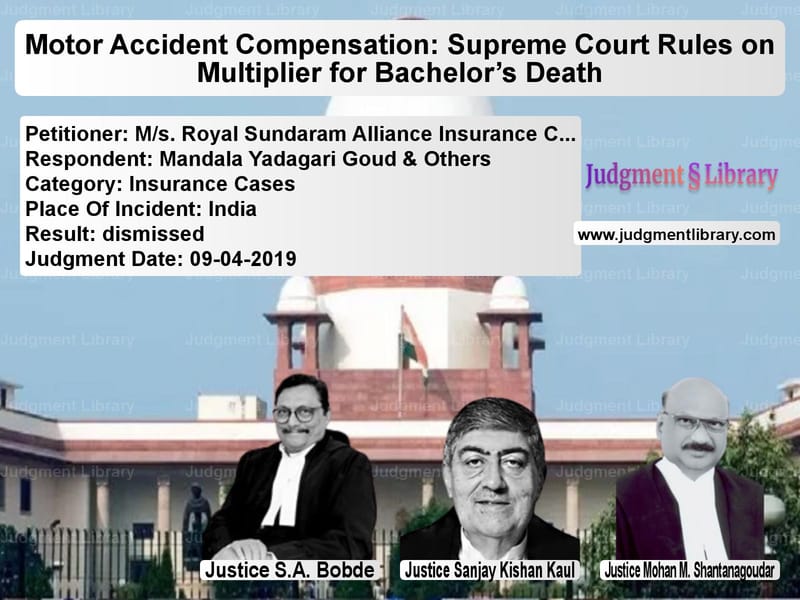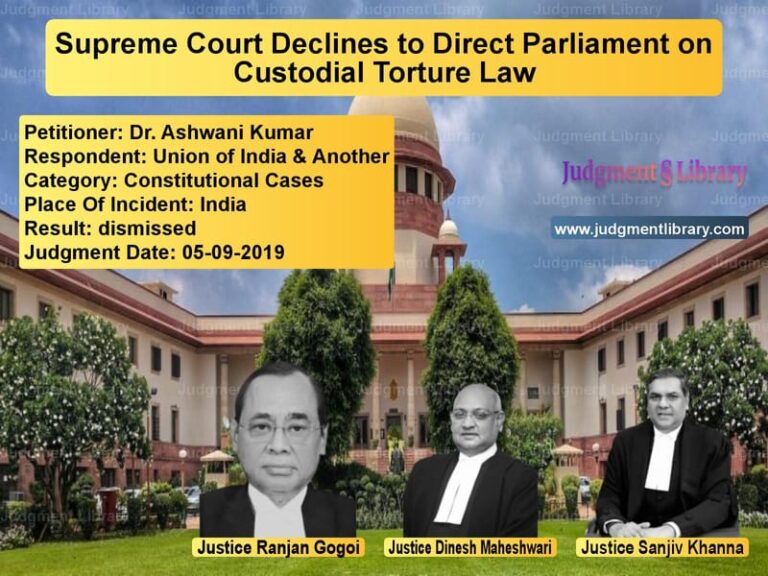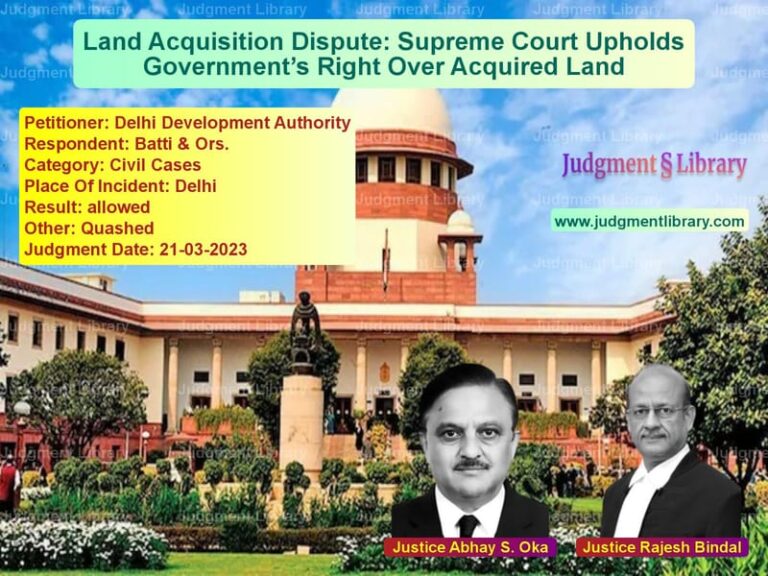Motor Accident Compensation: Supreme Court Rules on Multiplier for Bachelor’s Death
The Supreme Court of India, in a landmark judgment, has clarified the method of calculating compensation in motor accident cases involving the death of a bachelor. The ruling in M/s. Royal Sundaram Alliance Insurance Company Ltd. v. Mandala Yadagari Goud & Ors. reaffirmed that the age of the deceased, and not the age of the dependents, should be used for determining the multiplier in compensation calculations.
Background of the Case
The case revolved around a motor accident in which the deceased, a young bachelor, lost his life. The claimants, his parents, sought compensation from the insurer, Royal Sundaram Alliance Insurance Company Ltd. The Motor Accidents Claims Tribunal (MACT) and the High Court ruled in favor of the claimants, using the deceased’s age to determine the multiplier. The insurance company, however, argued that the age of the dependents (parents) should be the deciding factor, leading to a lower multiplier and, consequently, lower compensation.
The key legal issue before the Supreme Court was:
- Should the multiplier for calculating compensation in the case of a bachelor’s death be based on the age of the deceased or the age of the dependents?
Arguments Before the Supreme Court
Appellant (Insurance Company) Arguments:
- The insurer argued that in cases where the deceased was a bachelor, the compensation should be calculated based on the age of the dependents.
- They relied on two-judge bench decisions that supported their claim, asserting that the dependency factor should determine the multiplier.
- They challenged the High Court’s reliance on Sarla Verma v. Delhi Transport Corporation and Munna Lal Jain v. Vipin Kumar Sharma, arguing that these cases did not specifically deal with bachelor deaths.
Respondents (Claimants) Arguments:
- The claimants relied on the Supreme Court’s three-judge bench ruling in Sube Singh v. Shyam Singh, which held that the age of the deceased should be the determining factor.
- They highlighted that the principle was reaffirmed by the Constitution Bench in National Insurance Company Ltd. v. Pranay Sethi, confirming that the multiplier is linked to the deceased’s age.
- The claimants argued that since dependency benefits the family as a whole, the deceased’s earning potential should be the primary basis for compensation calculation.
Supreme Court’s Observations
The Supreme Court, while analyzing the legal precedents and arguments, made the following key observations:
- “The concept of insurance in motor accident cases is to compensate the dependents for the loss of financial support from the deceased.”
- “The determination of compensation should be based on uniform settled principles to maintain legal certainty.”
- “The loss of dependency is based on three factors: (i) the deceased’s income, (ii) deductions for personal expenses, and (iii) the multiplier applicable based on age.”
- “The multiplier is directly related to the deceased’s earning potential and expected work life.”
The Court reaffirmed that:
“A reading of the judgment in Sube Singh categorically shows that it is the age of the deceased, and not the age of the dependents, that should be used for determining the multiplier.”
Final Judgment
The Supreme Court dismissed the insurance company’s appeal and upheld the decisions of the lower courts. The key rulings included:
- The compensation calculation should use the age of the deceased, not the dependents, in applying the multiplier.
- The decision in Sube Singh is binding, as it was rendered by a three-judge bench, reaffirming the legal principle established in Sarla Verma and Pranay Sethi.
- The claimants were awarded compensation based on a multiplier of 16, considering the deceased’s age.
- The additional amount due to the claimants was ₹5,92,876 with an interest rate of 9%.
Conclusion
This judgment settles a crucial question in motor accident compensation cases involving bachelor victims. The ruling ensures uniformity in applying the multiplier, preventing insurers from reducing compensation by relying on the age of dependents. The decision reinforces the principle that compensation should reflect the deceased’s earning potential, providing rightful financial relief to families affected by fatal accidents.
Petitioner Name: M/s. Royal Sundaram Alliance Insurance Company Ltd..Respondent Name: Mandala Yadagari Goud & Others.Judgment By: Justice S.A. Bobde, Justice Sanjay Kishan Kaul, Justice Mohan M. Shantanagoudar.Place Of Incident: India.Judgment Date: 09-04-2019.
Don’t miss out on the full details! Download the complete judgment in PDF format below and gain valuable insights instantly!
Download Judgment: Ms. Royal Sundaram vs Mandala Yadagari Gou Supreme Court of India Judgment Dated 09-04-2019.pdf
Direct Downlaod Judgment: Direct downlaod this Judgment
See all petitions in Motor Insurance Settlements
See all petitions in Compensation Disputes
See all petitions in Negligence Claims
See all petitions in Judgment by S. A. Bobde
See all petitions in Judgment by Sanjay Kishan Kaul
See all petitions in Judgment by Mohan M. Shantanagoudar
See all petitions in dismissed
See all petitions in supreme court of India judgments April 2019
See all petitions in 2019 judgments
See all posts in Insurance Cases Category
See all allowed petitions in Insurance Cases Category
See all Dismissed petitions in Insurance Cases Category
See all partially allowed petitions in Insurance Cases Category







